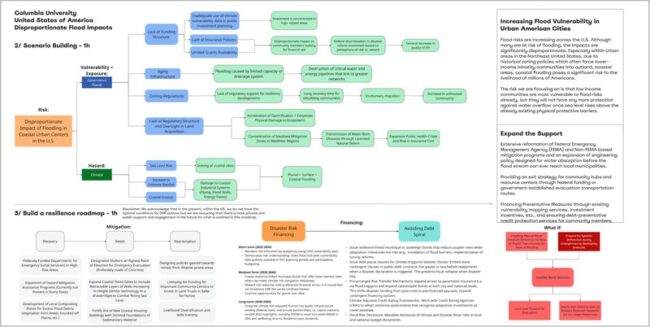Earlier this month, within a timeframe of less than 24 hours, a team of postgraduate and current students at the Columbia Climate School and the National Center for Disaster Preparedness (NCDP) worked through the night to develop and submit their entry for an international competition known as the U.N. Foresight Sprint.
Part of the Global Platform for Disaster Risk Reduction (UNDRR) Summit (GP2025) in Geneva, Switzerland, this real-world sprint tasked student teams with identifying what a disaster hazard would look like in 2050, seeking practical solutions and developing resilience investment plans in the form of a poster memo and a TikTok-style video, building upon the U.N. Global Assessment Report 2025.
“As the global GP2025 community discussed what comes after the Sendai Framework, a leading global framework in the reduction of disaster risk, which has an expiration date of 2030, the student team was actively charting ways to address these challenges at scale,” said Joshua DeVinenzo, the faculty-student team liaison and assistant director for education and training at NCDP.
Coastal Flooding
Choosing one hazard facing the U.S. in the next 25 years was no simple task; however, given the team’s prior research and interest in coastal flooding, they felt the most compelled to take on the sprint from this angle.
“Within hours, and from different locations, some of us, even while taking summer classes, identified a pressing national disaster issue, developed a plan and crafted a compelling narrative to inspire action,” said Renge Shirai, a 2025 Barnard College graduate. “Drawing on our diverse backgrounds and training, we addressed the disproportionate impact of flooding in U.S. coastal cities.”

“Participating in the UNDRR Foresight Sprint was an incredible opportunity to apply our classroom learning to a real-world challenge in disaster resilience,” said Ashmi Kuvera, a member of the student team. “Our team examined the disproportionate impact of coastal flooding on low-income urban communities in the U.S., mapping the risk through scenario building and root cause analysis. Designing a resilience roadmap using the 3Rs—recovery, resistance and reorientation—helped us re-imagine equitable adaptation strategies and the importance of disaster risk financing to avoid future debt spirals,” Kuvera said.
Amy Campbell, a 2025 graduate of the Climate School’s M.A. in Climate and Society program, led the development of the disaster risk financing section of the resilience roadmap for coastal flooding. “I outlined short-term, medium-term and long-term financial reforms to prevent a debt spiral disaster. This included proposals for resilience-linked bonds, risk-informed budgeting using the Climate Finance Vulnerability Index, and pre-arranged risk transfer mechanisms such as parametric insurance and catastrophe bonds,” Campbell said.
“When I heard about the foresight sprint, I was deeply compelled by the idea of coastal flooding and the impact this scenario will have on the sinking cities—not forgetting the low-income communities that will bear the brunt of this extreme event,” said Anyieth Philip Ayuen, a 2025 graduate of the Climate School’s M.A. in Climate and Society program. “It is hard to be optimistic looking into the future with the current extreme events we have. But one thing our sprint emphasized is optimism that action can lead us to a way of averting these crises.”
Disproportionate Flood Impacts
The team created a poster depicting their effort to detail a long-term plan to address the disproportionate impacts of flooding in the U.S. This unique exercise meant the team had to not only think through a series of “what if” scenarios, but they also had to discuss how to finance the needed disaster mitigation efforts. They also began to realize the hazard itself was just a small piece of the equation; the social, psychological, political and economic aspects would have to play a major role in their proposal. What had seemingly begun as a technical hackathon quickly became a people-centered discussion of the number of factors that would truly impact disaster foresight by 2050.

Working until 2 AM, Kayana Waller, a 2025 graduate of Columbia’s Teachers College, then designed and compiled the team’s video that served as the foresight submission.
“Our sprint focused on how this scenario can impact society, what drives it and why it is important to take action to avert it. Collaborating with individuals who were so reactive, proactive and passionate about the impact this would have on the world was the biggest motivation,” Ayuen said. “I am excited that the video will inspire leaders across the world to see value in taking necessary action to safeguard people. When we foresee, learn and act, we can solve the world’s most pressing challenges, such as coastal flooding.”
The Outcome
There were many entries from around the world, covering a wide range of hazards and plans. Columbia University was the only submission from the U.S. The videos and memo poster were featured in Geneva during the remainder of GP2025 and were shared by UNDRR with the national authorities in charge of disaster risk reduction and foresight in the U.S.
Looking back on the experience, Shirai said, “NCDP brings together people from different disciplines not just to discuss challenges, but to actively create solutions. It was an incredible experience to collaborate with such talented, passionate individuals who are committed to making a real difference.”
“In five years’ time, when we move toward the next iteration of the Sendai Framework, I have no doubt the students from this sprint team will be actively at the forefront, and this work was just a brief preview of their extraordinary approaches to this work in the future,” said DeVincenzo.
The student team consisted of Renge Shirai (Barnard), Kehbuma Nukuna (Columbia School of Engineering), Kayana Waller (Teachers College), Ashmi Kuvera (Climate School), Amy Campbell (Climate School), Anyieth Philip Ayuen (Columbia Climate School) and Michelle Rozenfeld (NCDP High School Intern).
For questions about this experience, please contact Joshua DeVincenzo at ncdptraining@columbia.edu.





